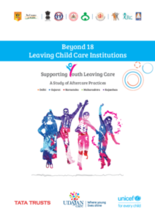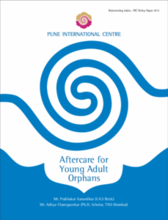childrens_living_arrangement
children_living_without_bio
Displaying 201 - 210 of 427
This report on Aftercare is based on research on “Current Aftercare Practices” (CAP), with regard to Children in Need of Care and Protection (CNCP), under the Juvenile Justice (JJ) Act, 2015, conducted in five states of India: Delhi, Gujarat, Karnataka, Rajasthan and Maharashtra. It is about the status of Aftercare youth, or Care Leavers (CLs) transitioning from state care to adulthood in the wider community.
"Days after the managing trustee of an orphanage was arrested for sexually exploiting four minor inmates, activists have demanded Child Welfare Committee, District Child Protection Unit and police personnel to conduct frequent inspections at the homes in the district," says this article from the New Indian Express.
The government of the state of Kerala in India has launched a new program to promote kinship care for children currently residing in child care instititions, according to this article from the Times of India.
This paper attempts to recommend a suitable policy framework of aftercare services for Young Adult Orphans (YAOs) in India, with special reference to the state of Maharashtra.
The goal of this research was to challenge or validate the assumptions that underpin existing impact and change focused solutions; to combat the complete dearth of data and lack of meaningful information available in the sector about the longer term effects of institutional care on children in India; and to enable programmes both within and outside of Make A Difference to be designed on the back of benchmarked and trackable outcomes.
“Current Aftercare Practices” (CAP) is a documentation exercise designed to look at the support and services received by CLs from the objective lens of an ‘Aftercare Quality Index’(AQI), calculated using the scores within 8 domains. This report covers a total of 98 young adults from Rajasthan, comprising of 40 males and 58 females CLs, from both Government and NGO-run Child Care Institutions (CCIs) and 17 youth who, as children, availed the benefits under the Palanhar scheme of the Rajasthan Government.
A descriptive study was undertaken to assess self-esteem and its associated factors among adolescents living in orphanage and with parents at home in a selected orphanage and community, West Bengal with the objectives to assess level of self-esteem among adolescents living in orphanage and in home and to find out the associated factors related to self-esteem.
This paper presents the current vulnerabilities faced by children and the scenario of child protection in India. While discussing the legal provisions prevailing in the country, it sheds light on the socio-cultural barriers that are creating resistance within the society in making the Alternative Care model (and the process of deinstitutionalisation of children) a success. Lastly it suggests viable options that may be helpful for the same.
An inquiry by police in the Indian state of Namakkal into an audio recording of a conversation on procuring babies for illegal adoption, "which sounded like one between a prospective buyer and a broker, uncovered a network involved in the sale of 30 newborns – 24 of them female -- from various parts of the State," says this article from the Hindu.
The government of the Indian state of Kerala is considering a plan to deinstitutionalize their residential care system, reintegrating children from child care institutions into their families of origin or finding family-based alternative care options such as foster care and adoption, according to this article from the New Indian Express.





